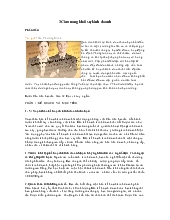Luận án Trải nghiệm khách hàng có luôn mang lại lợi ích cho các tổ chức dịch vụ? động cơ nhận thức và sự tương tác khách hàng trong bối cảnh dịch vụ thẩm mỹ
- Người chia sẻ : vtlong
- Số trang : 216 trang
- Lượt xem : 30
- Lượt tải : 500
Các file đính kèm theo tài liệu này
 luan_an_trai_nghiem_khach_hang_co_luon_mang_lai_loi_ich_cho.pdf
luan_an_trai_nghiem_khach_hang_co_luon_mang_lai_loi_ich_cho.pdf
- Tất cả luận văn được sưu tầm từ nhiều nguồn, chúng tôi không chịu trách nhiệm bản quyền nếu bạn sử dụng vào mục đích thương mại
Bạn đang xem trước 20 trang tài liệu Luận án Trải nghiệm khách hàng có luôn mang lại lợi ích cho các tổ chức dịch vụ? động cơ nhận thức và sự tương tác khách hàng trong bối cảnh dịch vụ thẩm mỹ, để xem tài liệu hoàn chỉnh bạn click vào nút DOWNLOAD LUẬN VĂN ở trên
The primary purpose of this study is to explain how and when customer experience
benefits the company. Built upon Customer-Dominant Logic, Social Identity theory
and Need for cognition, the study propose that customer experience leads to customer
engagement behavior via two routes: customer-firm and customer-employee
identification. Furthermore, the study advances that customers’ epistemic motivation
negatively moderates the mediated effect of customer experience on customer
engagement behavior. The methodologies used for the research is a combinition of
qualitative and quantitative technique. A survey method was employed for the two
studies by recruiting female consumers of beauty salons in Vietnam. The results
demonstrated that customer experience quality as a measurement for customer
experience applies to the context of the study and provided empirical support for the
hypotheses. This research found that customer experience identification positively
influences customer engagement behavior mediated by customer-firm and customeremployee identification. Furthermore, this research revealed that customer epistemic
motivation negatively moderates the mediated effect of customer experience on
customer engagement behavior via customer-employee identification. However, the
moderating role of customer epistemic motivation is insignificant for the mediated
relationship via customer-firm identification. Finally, this research offers theoretical
and practical contributions that are elaborated and further discussed.



